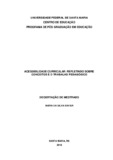| dc.creator | Xavier, Maíra da Silva | |
| dc.date.accessioned | 2019-06-24T15:38:19Z | |
| dc.date.available | 2019-06-24T15:38:19Z | |
| dc.date.issued | 2018-10-24 | |
| dc.identifier.uri | http://repositorio.ufsm.br/handle/1/17084 | |
| dc.description.abstract | This work systematizes the research developed within the scope of the Master’s Degree in Education at UFSM. The aim of this study is to analyze how the academic production has been built on the theme of school curriculum access for the target audience of Special Education. Regarding to the methodology, it consists through the qualitative approach, characterizing itself as a bibliographical research. As of problematizations about Curriculum and Special Education, a search was performed in the Catalog of Theses and Dissertations of Coordination of Personal Improvement of Higher Level (CAPES) and in the library of the website of National Association of Graduate Studies and Research in Education (ANPED) in the period from 2008 to 2017 with the descriptors: "curricular adequacy"; "curricular adaptation"; "curricular flexibility"; "reasonable adaptations" and "curricular accessibility". It was also used as an analysis material the guiding documents of the educational field. The theoretical framework is structured with the contributions of authors such as: Gimeno Sacristán (2000), Silva (2010); Correia (2016); Haas and Baptista (2014; 2015), Meirieu (1998; 2000) and Garcia (2007). The analytical process was developed based on the content analysis proposed by Bardin (2011), being presented the official documents analysis and, in the sequence, the academic productions. Some highlights of the research results were: evidence of recurrent change in concepts related to curriculum and Special Education in public policies; a concern of the official documents regarding the construction of parallel curriculum for students with disabilities; and that curricular adaptations and flexibilizations carry weaknesses in the pedagogical construction, and, in general, are configured as actions of curricular differentiation for students with disabilities. It is assumed that the constant changes in terms related to the scholar curriculum and Special Education in public policies do not reveal advances in the investment in school pedagogical practices. In this regard, it is necessary to broaden the perspective, realizing the different ways of learning and articulating the work developed in Specialized Educational Service (AEE) and in regular teaching. | eng |
| dc.language | por | por |
| dc.publisher | Universidade Federal de Santa Maria | por |
| dc.rights | Attribution-NonCommercial-NoDerivatives 4.0 International | * |
| dc.rights.uri | http://creativecommons.org/licenses/by-nc-nd/4.0/ | * |
| dc.subject | Currículo | por |
| dc.subject | Educação especial | por |
| dc.subject | Educação inclusiva | por |
| dc.subject | Políticas públicas | por |
| dc.subject | Práticas pedagógicas | por |
| dc.subject | Curriculum | eng |
| dc.subject | Special education | eng |
| dc.subject | Inclusive education | eng |
| dc.subject | Public policy | eng |
| dc.subject | Pedagogical practices | eng |
| dc.title | Acessibilidade curricular: refletindo sobre conceitos e o trabalho pedagógico | por |
| dc.title.alternative | Accessible curriculum: reflecting on concepts and pedagogical work | eng |
| dc.type | Dissertação | por |
| dc.description.resumo | Este trabalho sistematiza a pesquisa desenvolvida no âmbito do Curso de Mestrado em Educação/UFSM. O estudo tem por objetivo geral analisar como vem sendo construída a produção acadêmica sobre a temática de acesso ao currículo escolar para os alunos público-alvo da Educação Especial. Em relação a metodologia, se constitui através da abordagem qualitativa, caracterizando-se como uma pesquisa bibliográfica. Partindo de problematizações sobre Currículo e Educação Especial foi realizada uma busca no Catálogo de Teses e Dissertações da CAPES e na Biblioteca do site da ANPED – Associação Nacional de Pós-Graduação e Pesquisa em Educação, no período de 2008 a 2017 com os descritores: “adequação curricular”; “adaptação curricular”; “flexibilidade curricular”; “adaptações razoáveis” e “acessibilidade curricular”. Também foram utilizados como material de análise os documentos oficiais do campo educacional. O referencial teórico se estrutura com as contribuições de autores como: Gimeno Sacristán (2000), Silva (2010); Correia (2016); Haas e Baptista (2014; 2015), Meirieu (1998; 2000) e Garcia (2007). O processo analítico desenvolveu-se baseado na análise do conteúdo proposta por Bardin (2011), sendo apresentada a análise dos documentos oficiais e, na sequência, as produções acadêmicas. Destaca-se como resultados da pesquisa a evidência da mudança recorrente dos conceitos relacionados ao currículo e Educação Especial nas políticas públicas; o registro de uma preocupação dos documentos oficiais em relação a construção de currículos paralelos para os alunos com deficiência; e que as adaptações, adequações e flexibilizações curriculares apresentam fragilidades na construção pedagógica, e, em geral se configuram como ações de diferenciação curricular para os alunos com deficiência. Considera-se que as alterações constantes dos termos relacionados ao currículo escolar e a Educação Especial nas políticas públicas não revelam avanços no investimento nas práticas pedagógicas escolares. Para isso, é necessário ampliar o olhar percebendo os diferentes modos de aprender e articular os trabalhos desenvolvidos no AEE e no ensino comum. | por |
| dc.contributor.advisor1 | Bridi, Fabiane Romano de Souza | |
| dc.contributor.advisor1Lattes | http://lattes.cnpq.br/8914947342465602 | por |
| dc.contributor.referee1 | Haas, Clarissa | |
| dc.contributor.referee1Lattes | http://lattes.cnpq.br/6194230748165406 | por |
| dc.contributor.referee2 | Castro, Sabrina Fernandes de | |
| dc.contributor.referee2Lattes | http://lattes.cnpq.br/5892665490499253 | por |
| dc.creator.Lattes | http://lattes.cnpq.br/5116564060524012 | por |
| dc.publisher.country | Brasil | por |
| dc.publisher.department | Educação | por |
| dc.publisher.initials | UFSM | por |
| dc.publisher.program | Programa de Pós-Graduação em Educação | por |
| dc.subject.cnpq | CNPQ::CIENCIAS HUMANAS::EDUCACAO | por |
| dc.publisher.unidade | Centro de Educação | por |



